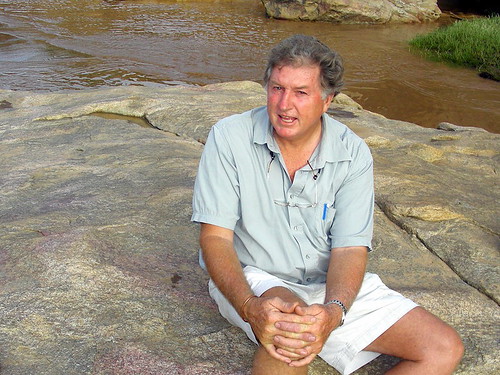
Phillip Leakey
The Question-Driven Life
By DAVID BROOKS
Published: August 18, 2011
Go to original
Rift Valley, Kenya
We are born with what some psychologists call an “explanatory drive.” You give a baby a strange object or something that doesn’t make sense and she will become instantly absorbed; using all her abilities — taste, smell, force — to figure out how it fits in with the world.
I recently met someone who, though in his seventh decade, still seems to be gripped by this sort of compulsive curiosity. His name is Philip Leakey.
He is the third son of the famed paleoanthropologists Louis and Mary Leakey and the brother of the equally renowned scholar, Richard Leakey. Philip was raised by people whose lives were driven by questions. Parts of his childhood were organized around expeditions to places like Olduvai Gorge where Louis and most especially Mary searched for bones, footprints and artifacts of early man. The Leakeys also tend to have large personalities. Strains of adventurousness, contentiousness, impulsivity and romance run through the family, producing spellbinding people who are sometimes hard to deal with.
Philip was also reared in the Kenyan bush. There are certain people whose lives are permanently shaped by their frontier childhoods. They grew up out in nature, adventuring alone for long stretches, befriending strange animals and snakes, studying bugs and rock formations, learning to fend for themselves. (The Leakeys are the sort of people who, when their car breaks down in the middle of nowhere, manage to fix the engine with the innards of a cow.)
This sort of childhood seems to have imprinted Philip with a certain definition of happiness — out there in the bush, lost in some experiment. Naturally, he wasn’t going to fit in at boarding school.
At 16, he decided to drop out and made a deal with his parents. He would fend for himself if they would hire a tutor to teach him Swahili. Kenya has 42 native tribes, and over the next years Phillip moved in with several. He started a series of small businesses — mining, safari, fertilizer manufacturing and so on. As one Kenyan told me, it’s quicker to list the jobs he didn’t hold than the ones he did.
The Leakey family has been prolifically chronicled, and in some of the memoirs Philip comes off as something of a black sheep, who could never focus on one thing. But he became the first white Kenyan to win election to Parliament after independence, serving there for 15 years.
I met him at the remote mountain camp where he now lives, a bumpy 4-hour ride south of Nairobi near the Rift Valley. Leakey and his wife Katy — an artist who baby-sat for Jane Goodall and led a cultural expedition up the Amazon — have created an enterprise called the Leakey Collection, which employs up to 1,200 of the local Maasai, and sells designer jewelry and household items around the world.
The Leakeys live in a mountaintop tent. Their kitchen and dining room is a lean-to with endless views across the valley. The workers sit out under the trees gossiping and making jewelry. Getting a tour of the facilities is like walking through “Swiss Family Robinson” or “Dr. Dolittle.”
Philip has experiments running up and down the mountainside. He’s trying to build an irrigation system that doubles as a tilapia farm. He’s trying to graft fruit trees onto native trees so they can survive in rocky soil. He’s completing a pit to turn cow manure into electricity and plans to build a micro-hyrdroelectric generator in a local stream.
Leakey and his workers devise and build their own lathes and saws, tough enough to carve into the hard acacia wood. They’re inventing their own dyes for the Leakey Collection’s Zulugrass jewelry, planning to use Marula trees to make body lotion, designing cement beehives to foil the honey badgers. They have also started a midwife training program and a women’s health initiative.
Philip guides you like an eager kid at his own personal science fair, pausing to scratch into the earth where Iron Age settlers once built a forge. He says that about one in seven of his experiments pans out, noting there is no such thing as a free education.
Some people center their lives around money or status or community or service to God, but this seems to be a learning-centered life, where little bits of practical knowledge are the daily currency, where the main vocation is to be preoccupied with some exciting little project or maybe a dozen.
Some people specialize, and certainly the modern economy encourages that. But there are still people, even if only out in the African wilderness, with a wandering curiosity, alighting on every interesting part of their environment.
The late Richard Holbrooke used to give the essential piece of advice for a question-driven life: Know something about something. Don’t just present your wonderful self to the world. Constantly amass knowledge and offer it around.
There's more about the projects at the blog Kenya Journal
No comments:
Post a Comment